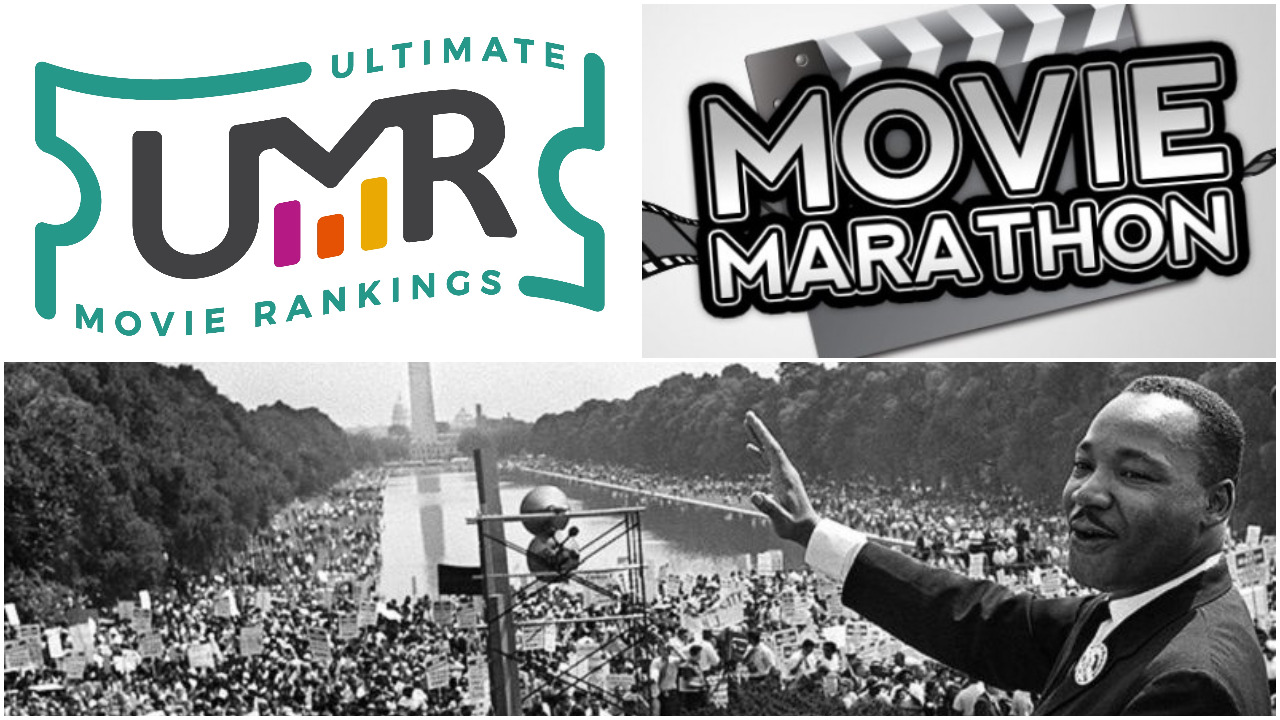 To celebrate Martin Luther King’s birthday, we felt it would be interesting to come up with a list of Civil Rights Movies n Chronological Order of the Real Events. To make our marathon the movie had to cover an actual event. Lots of movies cover this subject but all fictional stories were excluded from our marathon. To make it even more interesting we felt it should be in chronological order of the real events. So combing our love of movies and history we started researching. In the end we came up with 16 movies in our marathon.
To celebrate Martin Luther King’s birthday, we felt it would be interesting to come up with a list of Civil Rights Movies n Chronological Order of the Real Events. To make our marathon the movie had to cover an actual event. Lots of movies cover this subject but all fictional stories were excluded from our marathon. To make it even more interesting we felt it should be in chronological order of the real events. So combing our love of movies and history we started researching. In the end we came up with 16 movies in our marathon.
Our 16 movies in this Civil Rights Movie marathon include movies released in theaters, made for television and one documentary. We started in the Year 1841 and stopped in the Year 1968. This page attempts to cover 137 years. That time span saw the start and stop of the Civil War, World War I, World War II, and the Korean War. The Vietnam War was still going on in 1968. In that 137 years there were 28 different Presidents….from John Tyler to Richard Nixon.
Total running time to watch all 16 movies is 2,043 minutes or 34.05 hours or 1.41 days of non-stop Civil Rights movies. Each block of information provides the name of the real event, along with the actual date, and a brief description of the movie that retells the actual event. We understand that the movies are not always historically accurate but we really feel they do provide a basic background view of some of the most famous events of the Civil Rights movement.
Life Before The Civil War: 1841 through 1853
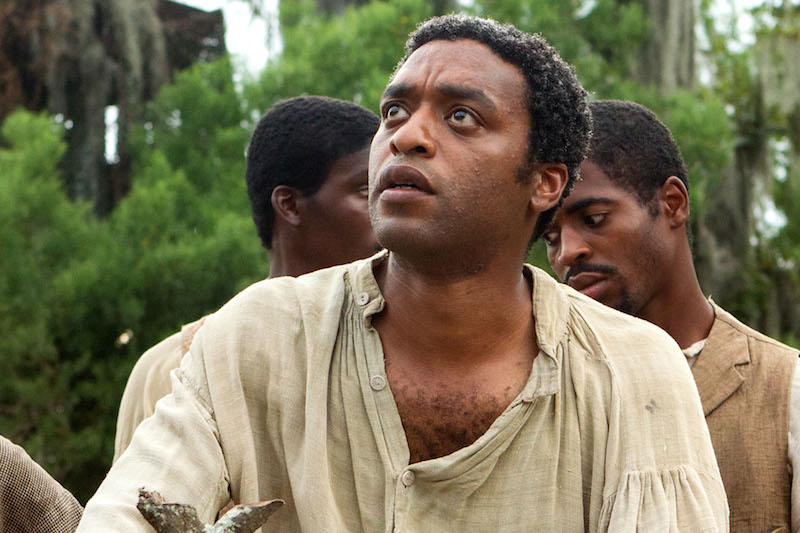
The real event: Solomon Northup was a free-born African American from New York, he was the son of a freed slave and a free woman of color. In 1841, he was offered a traveling musician’s job and went to Washington, D.C. There he was drugged, kidnapped, and sold as a slave. He was shipped to New Orleans, purchased by a planter, and held as a slave for 12 years. We he gained his freedom in 1853 he wrote Twelve Years A Slave and became an abolitionist for the remainder of his days.
The movie: Twelve Years A Slave (2013) Steve McQueen’s look at Solomon Northup’s 12 year nightmare is one of the best movies of the last 10 years. Quality of the movie? Won 3 Oscars® including Best Picture as well as a Best Supporting Actress Oscar® for Lupita Nyong’o.
Second Battle of Fort Sumter: Late 1862 – July 18th 1863

The actual event: Robert Gould Shaw accepted command of the first all-black regiment (54th Massachusetts) in the Northeast and encouraged the men to refuse their pay until it was equal to the white troops’ wage. The 54th would be one of the first all-black regiment to fight in the Civil War. Though it was a tactical defeat the publicity of the battle of Fort Wagner led to further action for black U.S. troops in the Civil War.
The movie: Glory (1989) Movie follows the origins of the 54th Massachesetts all-black regiment. Matthew Broderick plays Robert Gould Shaw while Morgan Freeman and Denzel Washington play soldiers in the regiment. This excellent movie won Denzel is first Oscar®….and it was deserved. One of our favorite movies of all-time.
13th Amendment to Constitution – January-April 14th 1865
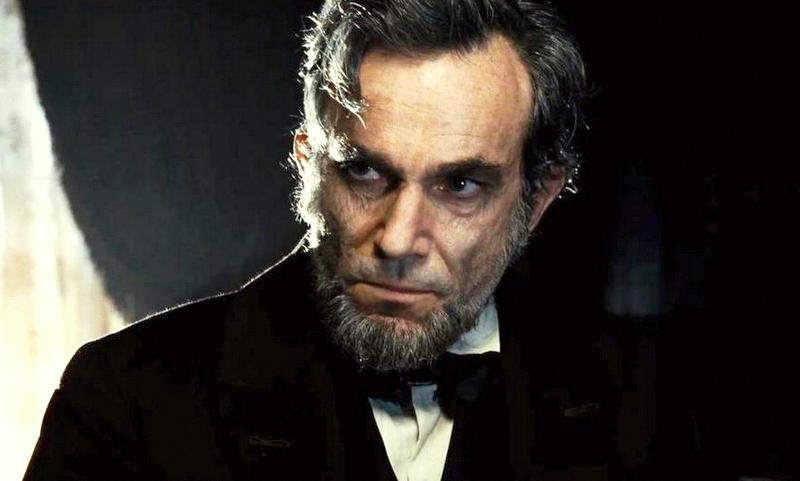
The actual event: Abraham Lincoln’s Emancipation Proclamation freed the slaves in 1863. As the war near it’s end Lincoln was concerned his proposed 13th amendment would be defeated by the returning slave states. Lincoln felt it was imperative to pass the amendment before that, thus removing any possibility slaves who have been freed may be re-enslaved. After many obstacles the 13 Amendment passed by a margin of two votes.
The movie: Lincoln (2012) Lincoln earned 12 Oscar® nominations winning twice. Daniel Day-Lewis is amazing as Lincoln….and won his record third Best Actor Oscar® for playing Lincoln. The movie follows Lincoln from January 1865 to April 14th 1865. On April 15th, Abraham Lincoln was assassinated while watching a play.
World War II: 1942 – 1945

The real event: The Tuskegee Airmen is the popular name of a group of African-American military pilots (fighter and bomber) who fought in World War II. 99th Pursuit Squadron and the 332nd Fighter Group flew in combat missions. The dive-bombing and strafing missions under Lieutenant Colonel Davis, Jr. were considered to be highly successful.
The movie: Red Tails (2012) A crew of African American pilots in the Tuskegee training program, having faced segregation while kept mostly on the ground during World War II, are called into duty under the guidance of Col. A.J. Bullard. This is a very enjoyable George Lucas produced movie. 1995’s The Tuskegee Airmen is another fine movie on this subject.
Jackie Robinson Joins The Brooklyn Dodgers: 1945 – 1947
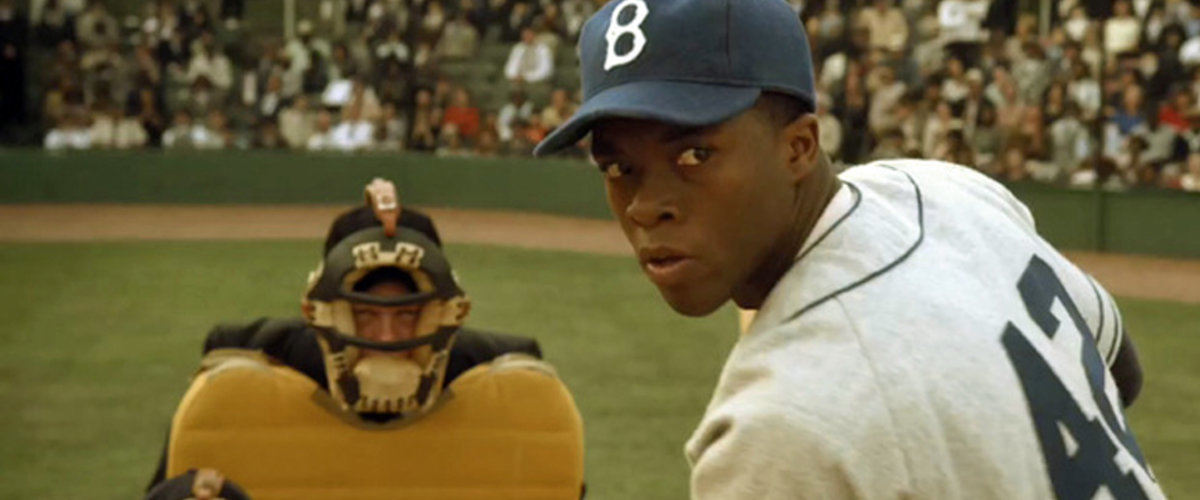
The real event: In August of 1945, Branch Rickey signed Jackie Robinson to a professional baseball contract. After spending 1946 in the minor leagues, Robinson was called up to the Dodgers 6 days before the start of the 1947. Robinson broke the baseball color line when the Dodgers started him at first base on April 15, 1947.
The movie: 42 (2013) In 1947, Jackie Robinson (Chadwick Boseman) becomes the first African-American to play in Major League Baseball in the modern era when he was signed by the Brooklyn Dodgers and faces considerable racism in the process. Harrison Ford in an outstanding performance plays Branch Rickey. Jackie Robinson actually played himself in 1950’s The Jackie Robinson Story…but 42 is a much better movie.
Brown Vs Board of Education: 1951 – May 17th 1954
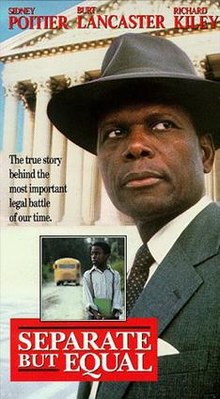
The real event: Brown v. Board of Education , was a landmark United States Supreme Court case in which the Court declared state laws establishing separate public schools for black and white students to be unconstitutional. Handed down on May 17, 1954, the unanimous (9–0) decision stated that “separate educational facilities are inherently unequal.” This was major victory of the Civil Rights Movement.
The movie: Seperate But Equal (1991)This mini-series stars movie legends Sidney Poitier and Burt Lancaster. A dramatization of the American court case that destroyed the legal validity of racial segregation. Poitier’s performance as Thurgood Marshall earned him a Golden Globe® and Emmy® nomination. Overall this excellent mini-series picked up 8 Emmy® nominations.
Rosa Parks: December 1st 1955

The real event: On December 1, 1955, in Montgomery, Alabama, Rosa Parks refused to obey bus driver James F. Blake’s order to give up her seat in the “colored section” to a white passenger, after the whites-only section was filled. Parks was not the first person to resist bus segregation…..but….Parks’ act of defiance and the Montgomery bus boycott became important symbols of the modern Civil Rights Movement.
The movie: The Rosa Parks Story (2002): Rosa Parks recalls events leading to her act of peaceful defiance that prompted the 1955 bus boycott in Montgomery, Alabama. Parks is played wonderfully by Angela Bassett. Bassett would earn an Emmy® nomination for her performance. Rosa Parks can be seen in the archive footage shown in this TV movie.
Montgomery Bus Boycott: December 1955 – December 1956
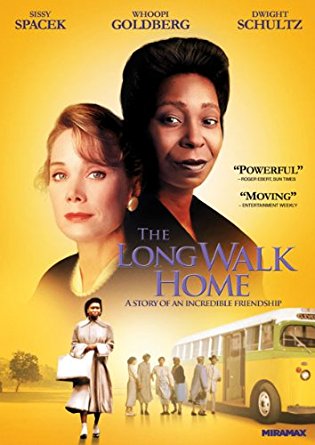
The real event: The Montgomery Bus Boycott was a seminal event in the Civil Rights Movement, was a political and social protest campaign against the policy of racial segregation on the public transit system of Montgomery, Alabama. The campaign lasted from December 5, 1955—to December 20, 1956, when a federal ruling, Browder v. Gayle, took effect, and led to a United States Supreme Court decision that declared the Alabama and Montgomery laws requiring segregated buses to be unconstitutional.
The movie: The Long Walk Home (1990) In this one, two women, black (Whoopi Goldberg) and white (Sissy Spacek), in 1955 Montgomery Alabama, must decide what they are going to do in response to the famous bus boycott lead by Martin Luther King. Cool movie trivia: One of the buses used in the background is the actual bus #2857 on which Rosa Parks was arrested.
NASA Help on Friendship 7 – 1958 – February 20th 1962

The real event: Katherine Coleman Goble was an African-American mathematician who made contributions to the United States’ aeronautics and space programs with the early application of digital electronic computers at NASA. Known for accuracy in computerized celestial navigation, she conducted technical work at NASA that spanned decades. During this time, she calculated the trajectories, launch windows, and emergency back-up return paths for many flights from Project Mercury, including the early NASA missions of John Glenn (Friendship 7 launched on 2/20/62) and Alan Shepard, and the 1969 Apollo 11 flight to the Moon,
The movie: Hidden Figures (2016) The story of a team of female African-American mathematicians who served a vital role in NASA during the early years of the U.S. space program. Watching the struggles the three main characters in this movie deal with in this movie will truly make you understand how messed up things were back then.
16th Street Bapist Church Bombing – September 15, 1963
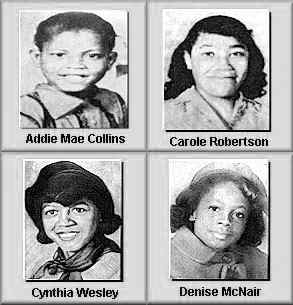
The real event: The 16th Street Baptist Church bombing was an act of white supremacist terrorism. This occurred at the African-American 16th Street Baptist Church in Birmingham, Alabama, on Sunday, September 15, 1963, when four members of the Ku Klux Klan planted at least 15 sticks of dynamite attached to a timing device. Described by Dr. Martin Luther King Jr. as “one of the most vicious and tragic crimes ever perpetrated against humanity”, the explosion at the church killed four girls and injured 22 others.
The movie: 4 Little Girls (1997) Spike Lee’s movie of the notorious racial terrorist bombing of an African American church during the Civil Rights Movement is the only documentary in our marathon. 4 Little Girls received a Best Documentary Oscar® nomination and is a must watch!
Murders of Chaney, Goodman, and Schwerner – June 1964
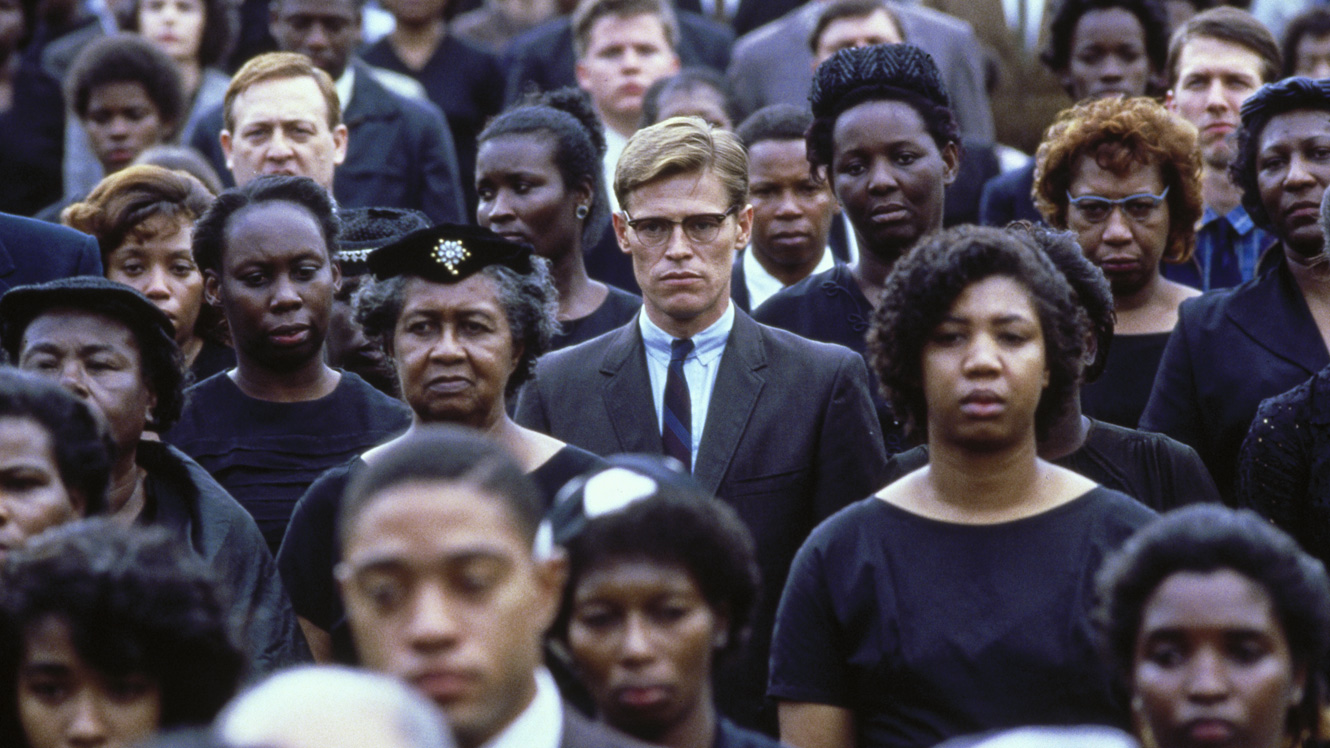
The real event: The Mississippi Burning murders, involved three activists that were abducted and murdered in Neshoba County, Mississippi in June 1964 during the Civil Rights Movement. They had been working with the Freedom Summer campaign by attempting to register African Americans in Mississippi to vote. This registration effort was a part of contesting over 70 years of laws and practices that supported a systematic policy of disenfranchisement of potential black voters by several southern states that began in 1890.
The movie: Mississippi Burning (1988) Two F.B.I. Agents (Gene Hackman and Willem Dafoe), with wildly different styles, arrive in Mississippi to investigate the disappearance of some civil rights activists. This movie picked up 7 Oscar® nominations…including a Best Picture nomination. If you have time check out 1997’s 4 Little Kids…which is an excellent documentary that details the tragic death of four little girls in a church bombing.
Civil Rights Act of 1964: Enacted July 2nd, 1964
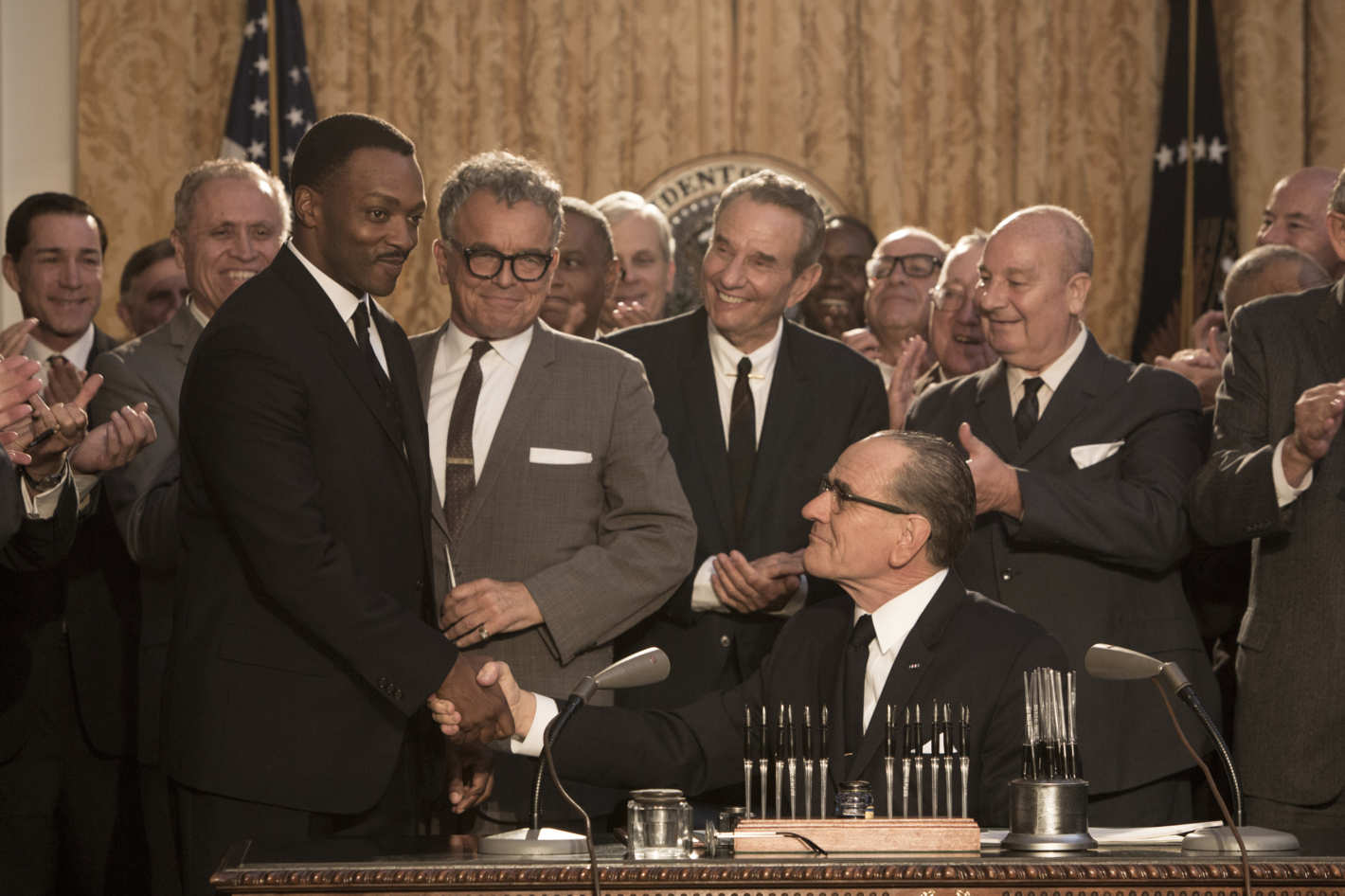
The real event: The Civil Rights Act of 1964 is a landmark civil rights and US labor law in America that outlaws discrimination based on race, color, religion, sex, or national origin. It prohibited unequal application of voter registration requirements, racial segregation in schools, employment, and public accommodations. Powers given to enforce the act were initially weak, but were supplemented during later years.
The movie: All The Way (2016) Lyndon Johnson becomes the President of the United States in the chaotic aftermath of John F. Kennedy’s assassination and spends his first year in office fighting to pass the Civil Rights Act. In this HBO movie, Bryan Cranston plays LBJ while Anthony Mackie plays Martin Luther King. This movie picked up 8 Emmy® nominations.
Selma to Montgomery March : March 21st – March 25th 1965
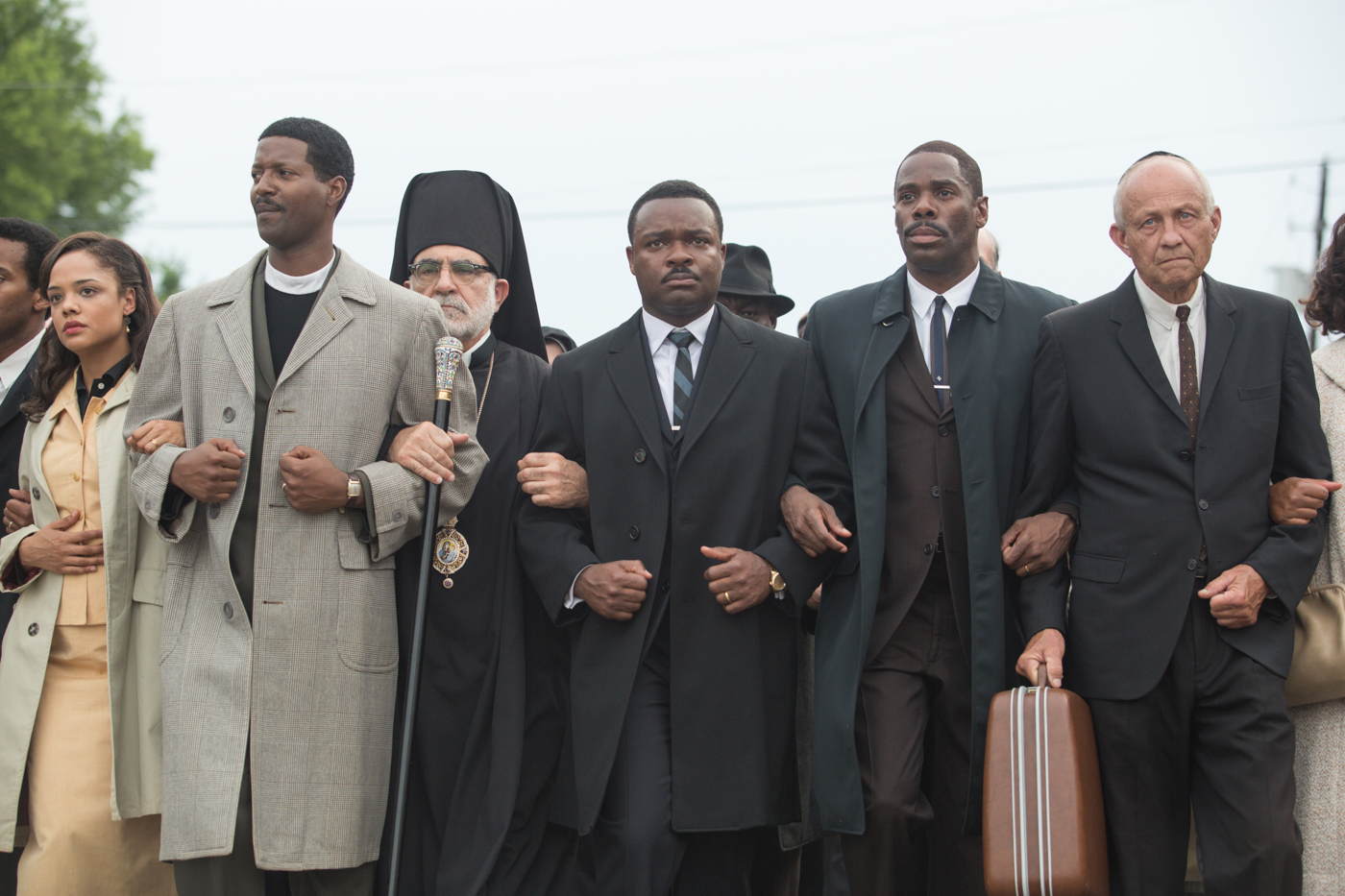
The real event: The 54-mile march was organized by nonviolent activists to demonstrate the desire of African-American citizens to exercise their constitutional right to vote, in defiance of segregationist repression, and were part of a broader voting rights movement underway in Selma and throughout the American South. By highlighting racial injustice, they contributed to passage that year of the Voting Rights Act, a landmark federal achievement of the Civil Rights Movement.
The movie: Selma (2014) This movie is a chronicle of Dr. Martin Luther King, Jr.’s campaign to secure equal voting rights via an epic march from Selma to Montgomery, Alabama, in 1965. David Oyelowo earned a Golden Globe nomination for playing King. Somehow he did not receive an Oscar® nomination for the the movie.
Loving Vs Virginia: June 12th 1967

The real event: Loving Vs Virginia is a landmark civil rights decision of the United States Supreme Court, which invalidated laws prohibiting interracial marriage. Richard and Mildred Loving were married in 1958. They were by law, not allowed to live together in Virginia. In 1964, Mildred, sent a letter of protest to then Attorney General, Robert F. Kennedy. Kennedy referred her to the American Civil Liberties Union (ALCU). It took their case three years to reach the Supreme Court.
The movie: Loving (2016) Loving details the story of Richard and Mildred Loving, a couple whose arrest for interracial marriage in 1960s Virginia began a legal battle that would end with the Supreme Court’s historic 1967 decision. Ruth Negga earned a Best Actress Oscar® nomination for her role as Mildred.
Detroit Riots: July 23rd – July 27th 1967

The real event: The Detroit Riots of 1967 were the bloodiest race riot in the five-year wave of violence known as the “long, hot summers of 1964-68. The precipitating event was a police raid of an unlicensed, after-hours bar then known as a blind pig, on the city’s Near West Side. It exploded into one of the deadliest and most destructive riots in American history, lasting five days and surpassing the violence and property destruction of Detroit’s 1943 race riot just 24 years earlier.
The movie: Detroit (2017) This fact-based drama is set during the 1967 Detroit riots in which a group of rogue police officers respond to a complaint with retribution rather than justice on their minds. Movie stars John Boyega (Star Wars) and Anthony Mackie.
Assassinations of Martin Luther King and Bobby Kennedy: April 4th, 1968 and June 5th, 1968
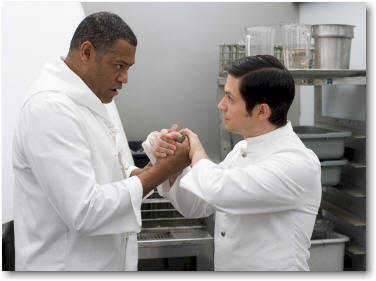
The real event: Within two months in 1968, the Civil Rights Movement lost two of their greatest leaders. First on April 4th, Martin Luther King was assassinated. Then almost two months to the day Robert Kennedy was assassinated after winning the California Democrat Presidential Primary.
The movie: Bobby (2006) The story of the assassination of U.S. Senator Robert F. Kennedy, who was shot in the early morning hours of June 5, 1968 in the Ambassador Hotel in Los Angeles, California, and twenty-two people in the hotel, whose lives were never the same. This movie does a pretty good job of capturing the mood of America after a very brutal 5 year span. Seems after the tragic deaths of MLK and RFK that things turned towards better days….granted we still….almost 50 years later have a long way to go.
Some of the movies that we did not make our marathon
- Lee Daniels’ The Butler
- The Help
- Malcolm X
- The Great White Hope
- The Bingo Long Traveling All-Stars & Motor Kings
- The Birth of a Nation (2016)
- Free State of Jones
- Ghost of Mississippi
- 10,000 Black Men Named George
- Glory Road
- In The Heat of the Night
- Roots
- Guess Whose Coming To Dinner
- Amistad
- To Kill A Mockingbird
We could not find any movies on the Harlem Hellfighters…but we did not want to exclude them…so our last section is about the African Americans that fought in World War1 between 1913-1918
The actual event: 369th Infantry Regiment was an infantry regiment during World War I. The Regiment consisted mainly of African Americans, though it also included a number of Puerto Rican Americans during World War II. It was known for being the first African American regiment to serve with the American Expeditionary Forces during World War I. Sadly there does not seem to be any movies about the Harlem Hellfighters. Two members of the regiment, Henry Johnson and Needham Roberts fought off a 24-man German patrol, though both were severely wounded. They would win World War I Victory Medals.
The movie: Even though almost half a million African Americans served in World War 1, there are sadly very few movies about their service. The soldiers were treated horribly when they returned home. Many considered their horrible treatment one of the first big steps to the start of the Civil Rights movement.
Any feedback would greatly be appreciated…..Happy Martin Luther King Day.
great page. perfect re-release. I loved places in the heart and driving miss daisy as possible honorable mentions.
Hi Bruce,
I’m a little late commenting on this page as I wanted to digest all the information, but I’ll add my congratulations as you have done an outstanding job, covering an interesting, sensitive and very topical social issue and its treatment in the movies. It’s ironic to note that although D. W. Griffith’s blatantly racist, Birth of a Nation, had a momentous influence on the development of American cinema, Hollywood has churned out many excellent anti-racist or civil rights historical films. It did, however, take a while for these films to start being made and I note that all of the 16 films on your list are relatively recent, with the oldest one, Mississippi Burning, dating from 1988. Before that, there was of course To Kill a Mocking Bird (1962), which gets an honorable mention, and Sidney Poitier’s films, many of which dealt with race issues, albeit in a fictional manner. Poitier himself, as the first black actor to become a major star and an activist during the 60s, played an important role through his films in advancing the civil rights cause.
I have seen 7 of the 16 films, with Mississippi Burning, 12 Years a Slave and Lincoln being my favorites (though Lincoln was more complex that I thought and I would need to watch it again to fully appreciate it). Worth highlighting for my part are the excellent Malcom X, with a great performance by Denzel Washington, and especially the seminal minis-series, Roots, both of which didn’t quite make the list but at least get honorable mentions. One cannot underestimate the impact of Roots in reaching out and educating millions of North Americans on slavery in the late 1970s. As a kid, I recall my family, like so many others on the continent, being glued to the TV for each episode of the series and being mesmerized by it. This is not a criticism as I can see that you are focusing on movies, rather than TV series (with Separate But Equal being an exception perhaps because it is more akin to a movie than a series due to its shorter length).
It was quite timely for me to read this page as after going through Steve’s William Shatner’s video, I was curious to watch The Intruder (1962), starring a very young Shatner stirring havoc in a small Southern town that is just entering the era of integration in schools. It’s a captivating little film, significantly ahead of its time. Not sure if it had any impact at the time of its release, but it’s something of a minor gem, and the best thing I’ve seen Shatner in next to Star Trek.
Hey PhilHOF17
1. Thanks for checking out our Civil Rights page.
2. I really liked how this one turned out. Being a movie nut…..now knowing the order the events happened by the movies…helps me get a better understanding of the movement.
3. Birth of a Nation was considered…but with the KKK being the heroes of the movie…..it did not fit with this page.
4. Same thing with the Poitier movies…when I first started working on a massive table of movies…To Kill A Mockingbird, Guess Who’s Coming To Dinner, The Defiant Ones and The Help were entered quickly…..but when the page concept changed….those movies did not make the timeline.
5. I did not include Roots or Amistad……based on the years those movies covered…that story starts in 1750…..and I really wanted to concentrate on the post 1940s movement.
6. Yes…..sadly I had to include television movies here….but so far television is the only ones to cover many of these events.
7. I agree The Intruder like Hidden Figures…does not cover any ground breaking legal laws….but does a great job of setting the tone of the times. Good old Billy does pretty well in that one.
Good feedback.
HI BRUCE – PS to my previous post.
1 As well as Rosa Parks Dr King himself was of course included in Time’s list of the 100 Greatest. I’ve mentioned before that the list covers politicians like Roosevelt, intellectuals such as Einstein, sportsmen such as Ali and 4 Hollywood mainstream performers – Sinatra, Monroe, Chaplin and Mumbles [the Dan-like links are certainly bouncing off the walls this time round!]
2 The central criterion for inclusion was apparently the perceived level of influence that the entrants had on 20th century life and whilst there will always be controversy about any fine tuning in ranking those believed to be the Greatest of the Great, in my opinion Dr King and Rosa deserved their places as much as anyone I can think of [Joel excepted of course!]
3 By the way I enjoyed all your feedback on my post-holiday comments and as I’ve told Steve I enjoyed myself and thank both of you for your kind thoughts.
Hey Bob…..(1) Good selections for the 100 greatest. (2) Dan will be proud….lol. (3) Joel is smiling….because even though you are not a fan….you mentioning him….keeps him alive in the land of the dead……lol. (4) Glad you had a good trip……and glad you like the feedback. Good stuff.
HI BRUCE
1 US Civil Rights and their treatment on screen is a subject on which I would happily write until the cows come home. However for now I’ll leave the final word to my Jimmy’s wonderful Charlie Anderson in the 1965 Shenandoah, a film that has historically earned praise for its anti-war and humanitarian themes and which was probably Stewart’s last truly great stand-alone commercial and critical success. It reduced me to tears when I first saw it over half a century ago.
2 Jimmy’s Papa Charlie has doggedly kept his 6 sons out of the American Civil War. Those sons include Patrick Wayne the real-life son of Stewart’s fellow all-time Great and Liberty Valance co-star. Patrick actually made 11 movies with his dad The Duke – I wonder who got top billing and has the “Dan-ing” ever been more intense!?
3 Anyway when challenged by one of his sons about why Charlie does not feel that the Civil War concerns his family enough for them to fight in it Papa reprovingly retorts “Do WE own any slaves Boy?”
Hey Bob….glad you liked this page. I am sure in the future I will do a page that covers all civil rights for all groups……that was the original idea…until I decided to do it this way.
Shenandoah was probably using current events and discussing them in a historical movie…pretty much like how The Post is really about the current political turmoil here in my home country.
I remember that line well from Mr. Stewart. Good feedback.
BRUCE
As regards my mentioning Joel when the occasion presents itself, you know the old saying “If you can’t beat em join em!”.
Hey Bob….Joel has not been commenting much lately….I have not done many classic thespians lately….but he is ready to go with his thoughts….lol.
HI BRUCE 1 Good idea assembling a selection of Civil Rights films to celebrate the birth of Martin Luther King. It was too an idea that was well executed with for example a synopsis of the actual event in each case being given along with a brief comment on the film itself. Something for both the student of general history and movie buffs!
2 I liked Separate but Equal as it teamed Lancaster and Poitier and I found it interesting that in that movie Burt, a strong supporter of civil rights, played a lawyer who represented the opposition. The Rosa Parks story also especially appealed to me and in fact Rosa was included as one of the 100 Greatest people of the 20th Century in that Time magazine list that I have previously mentioned on Cogerson. The excellent Mississippi Burning too is one of my very favourite Hackman films.
3 You are aware of my weakness for trying to link, however tenuously, my own favorite performers to your themes and whilst my Jimmy’s 1950 western Broken Arrow was not a true Civil Rights film historians reckon that it was nonetheless supportive of the general cause as the historians say that it was one of the few major post 2nd World War movies to be sympathetic to the plight of the Indian community in movies about the Wild West.
4 Your supplementary list mentions Roots and in Roots 2 my Mumbles won an Emmy for playing the US Nazi leader George Lincoln Rockwell. The Dan-like link between your tribute to Dr King and the Great Mumbler is that the latter was so reportedly depressed by Martin Luther’s assassination that he went into seclusion for a brief period and according to biographers was therefore unavailable to take up Newman’s request that he play Butch to Paul’s Sundance. Newman claimed to have offered his mumbling idol a role in every movie over which Paul, another Civil Rights enthusiast of course. had production control.
5 Perhaps though my one slight disappointment with your lists is that they exclude my Greg’s Civil Rights lawyer Atticus Finch who has headed popularity lists of greatest screen heroes, who was based on a real-life character, writer Harper Lee’s father, who like Atticus in To Kill a Mockingbird represented black defendants in a highly publicised criminal trial. However to again quote Hackman in Hoosiers/Best Shot “We are here to support who we are and not who we are not,” and I certainly appreciate all of the well-researched selections that you HAVE made so overall I award your Dr Kin g tribute a very high Stevie “Vote Up!”
Hey Bob
1. Thanks for checking out this Civil Rights page….it was fun to do….and I actually learned some things I did not know before.
2. I will have to check out Seperate But Equal….I am surprised that I had not heard of that movie…..two AFI legends together……it is now on my must watch list. I am sure Burt’s thinking was….it was important to get the story out….even if he was on the wrong side in the movie.
3. Good point about Broken Arrow.
4. I knew Marlon was in Roots 2…..but I have not seen it……for some reason…..I have avoided tv movies… one of my flaws…..yes….one of many….lol.
5. At one point To Kill A Mockingbird was on the page……the original idea was to do a table….but it turned into this instead….but in our database…To Kill A Mockingbird is one of the movies in the “Civil Rights” category.
I will add it to the Honorable Mention list.
Thanks for the high praise for this page…it is appreciated.
Love this. A round of applause to UMR.
Thank you Taylor….your kind words are appreciated.